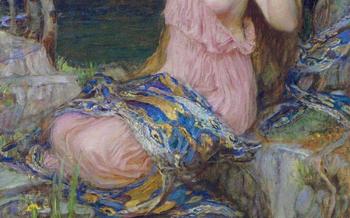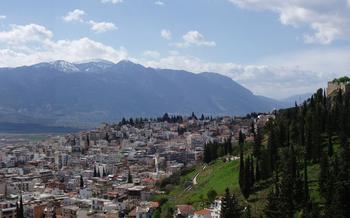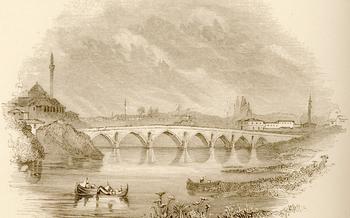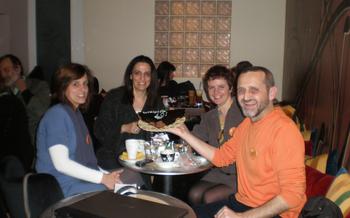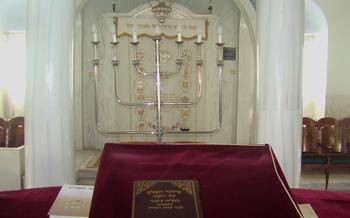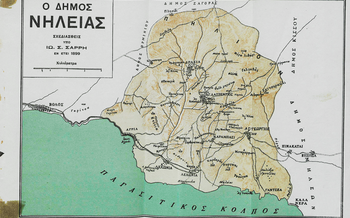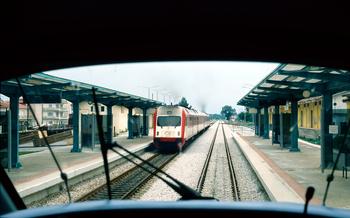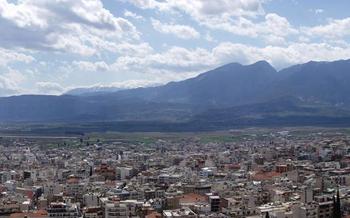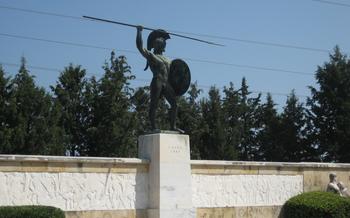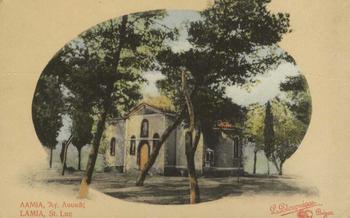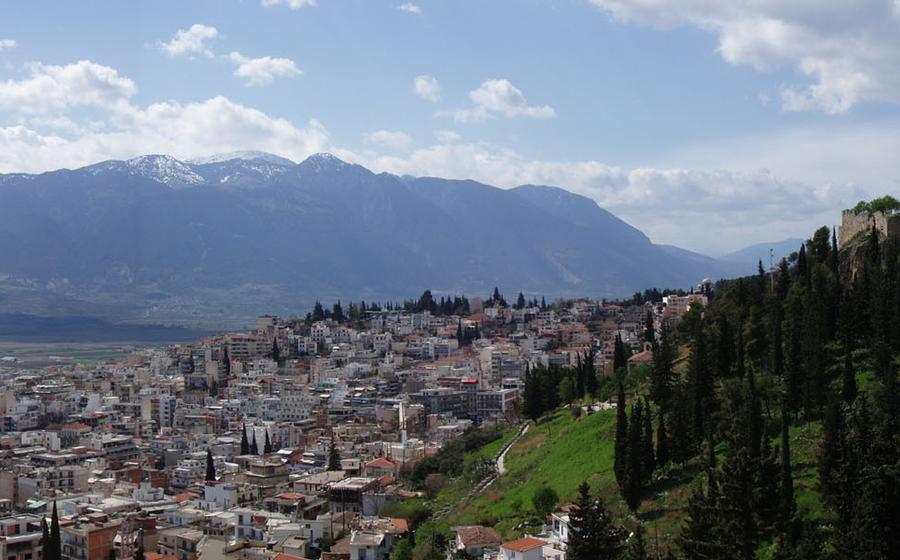
Sesklo Neolithic Settlement
- Historical Significance
- Location and Accessibility
- Excavations and Discoveries
- Museum of Sesklo: A Window into Neolithic Life
- Exploring the Settlement
- Neolithic Lifestyle
- Religious Beliefs and Rituals
- Local Cuisine and Hospitality
- Nearby Attractions
- Best Time to Visit:
- Photography and Videography:
- Sustainable Tourism
- Educational Opportunities
- Accessibility for All
- Insider Tip
Historical Significance
Sesklo, nestled in the heart of Thessaly, Greece, holds an unparalleled significance as the site of one of the earliest organized human settlements in Europe. Dating back to the 7th millennium BC, Sesklo represents the dawn of Neolithic civilization, a period marked by the transition from nomadic hunting and gathering to settled agricultural communities. This ancient settlement offers a glimpse into the roots of Greek and European history, providing valuable insights into the origins of our modern world.
As you explore Sesklo, you'll discover the remnants of a vibrant community that laid the foundation for future civilizations. Unearth the stories of the first farmers who cultivated crops, domesticated animals, and established permanent dwellings. Witness the birth of pottery, a defining characteristic of Neolithic culture, and marvel at the intricate designs and craftsmanship of these early artisans.
Sesklo's legacy extends beyond its physical remains. It represents a turning point in human history, symbolizing the transition from a transient existence to a settled way of life. The innovations and advancements that emerged from this Neolithic community, such as agriculture, pottery, and community organization, laid the groundwork for the development of complex societies and the rise of civilizations across the world.
Location and Accessibility
The picturesque village of Sesklo, nestled amidst the verdant Thessalian countryside, beckons travelers to delve into the annals of history. Situated just 15 kilometers from the city of Lamia, Sesklo's allure lies in its easy accessibility. Whether embarking on a road trip or utilizing the region's efficient public transportation network, visitors can seamlessly reach this Neolithic gem. Guided tours are readily available, offering a wealth of insights into the site's significance and captivating stories.
Excavations and Discoveries
The story of Sesklo's revelation began in the early 20th century when Greek archaeologist Christos Tsountas unearthed the first traces of the Neolithic settlement. Subsequent excavations, led by renowned archaeologists like Valmin and Milojčić, further revealed the extent and significance of the site. These meticulous digs brought to light a treasure trove of artifacts that painted a vivid picture of life in the Neolithic era.
Among the most remarkable findings were the exquisitely crafted pottery shards, adorned with intricate patterns and vibrant colors. These ceramic vessels hint at the artistic prowess and technical skills of the Sesklo inhabitants. Stone tools, including arrowheads, scrapers, and axes, provided insights into their hunting and agricultural practices. The discovery of clay figurines, depicting both humans and animals, shed light on their religious beliefs and rituals.
These unearthed treasures offer a glimpse into the daily lives of the Sesklo people, revealing their ingenuity, resourcefulness, and cultural sophistication. They underscore the importance of Sesklo as a pivotal site in understanding the origins of European civilization and the development of human society.
Museum of Sesklo: A Window into Neolithic Life
Adjacent to the Sesklo settlement lies a treasure trove of knowledge—the Museum of Sesklo. Within its walls, visitors embark on a journey through time, exploring the rich cultural heritage of the Neolithic period. The museum houses an array of artifacts unearthed during the excavations, each piece telling a unique story about the daily life and customs of the Sesklo inhabitants.
From intricately painted pottery and finely crafted tools to enigmatic figurines and religious objects, the exhibits provide a glimpse into the ingenuity and artistry of our ancestors. Curated with meticulous care, the museum's displays narrate the evolution of human society, showcasing the transition from a nomadic lifestyle to a settled agricultural existence.
Interactive exhibits and educational displays bring the Neolithic period to life, allowing visitors to engage with the past in a meaningful way. The museum also hosts regular workshops and lectures, providing opportunities for visitors to delve deeper into the history and significance of the Sesklo settlement.
Exploring the Settlement
The ancient settlement of Sesklo sprawls across a picturesque hillside, offering a glimpse into the organized Neolithic society that once thrived here. As you wander through the site, you'll encounter the remains of houses, streets, and public spaces, all arranged in a well-thought-out layout. The houses, built from mud-brick and stone, provide insights into the domestic life of the Sesklo inhabitants. Their circular shape and carefully constructed hearths suggest a focus on family life and communal living.
The defensive walls that surround the settlement hint at the importance of security and protection in this ancient community. Thick and imposing, these walls served as a barrier against potential threats and ensured the safety of the inhabitants within.
A map or diagram of the site can greatly enhance your exploration, helping you navigate the various features and understand their significance. Whether you choose to explore independently or join a guided tour, Sesklo's layout offers a tangible connection to the past, allowing you to step back in time and imagine the daily life of this remarkable Neolithic society.
Neolithic Lifestyle
The Sesklo inhabitants led a life deeply rooted in agriculture, crafting, and a strong sense of community. Farming was the backbone of their economy, with wheat, barley, and lentils being their primary crops. They also domesticated animals such as sheep, goats, and cattle, which provided them with a steady source of meat, milk, and wool.
Craftsmanship flourished in Sesklo, with skilled artisans creating pottery, tools, and intricate figurines. Their pottery, often decorated with beautiful patterns, is a testament to their artistic talents. Stone tools, including axes, arrowheads, and scrapers, were essential for their daily tasks and hunting.
Social customs played a crucial role in maintaining harmony within the community. The family unit was highly valued, and women held a significant position in society. They were responsible for household chores, raising children, and contributing to agricultural activities.
The Neolithic lifestyle at Sesklo laid the foundation for later Greek civilization. Their agricultural practices, social structures, and cultural traditions would go on to shape the development of one of the world's most influential civilizations.
Religious Beliefs and Rituals
The inhabitants of Sesklo held a deep reverence for the divine and engaged in various religious practices and rituals. Excavations have uncovered sacred spaces and artifacts that provide insights into their spiritual beliefs. Fertility and ancestor worship were central to their religious life. The discovery of figurines, amulets, and votive offerings suggests that they sought divine protection and blessings for their crops, livestock, and families. Rituals involving offerings and sacrifices were performed to honor their ancestors and ensure the continuity of the community. Understanding these religious beliefs and practices offers a glimpse into the spiritual dimension of the Sesklo Neolithic community, highlighting the interconnectedness between their daily lives and their connection to the divine.
Local Cuisine and Hospitality
When visiting Sesklo, be sure to savor the delicious local cuisine that reflects the rich culinary traditions of Greece. Indulge in traditional Greek dishes such as moussaka, pastitsio, and souvlaki, which are widely available in nearby tavernas and restaurants. Don't miss the opportunity to try the regional specialties, including the famous Tyrokafteri, a spicy cheese dip served with warm pita bread.
The people of Sesklo are known for their warm hospitality and friendly nature. Engage with the locals to learn about their culture and traditions. Visit family-run tavernas to experience the genuine Greek spirit, where you'll be welcomed with open arms and treated to delicious home-cooked meals. Immerse yourself in the local way of life and create lasting memories through these authentic interactions.
Nearby Attractions
Sesklo is nestled in a region rich in historical and natural wonders. Just a short drive away, visitors can explore the Lamia Archaeological Museum, which houses an impressive collection of artifacts from various archaeological sites in the area. The museum provides a deeper understanding of the region's rich history and cultural heritage.
History buffs can also visit the Thermopylae Battle Site, where the famous battle between the Spartans and the Persians took place in 480 BC. This site holds immense historical significance and offers a glimpse into the bravery and sacrifice of the Spartan warriors.
Nature enthusiasts will delight in exploring the Mount Ossa National Park, renowned for its breathtaking landscapes, diverse flora and fauna, and challenging hiking trails. The park is a haven for outdoor enthusiasts, offering opportunities for hiking, camping, and wildlife spotting.
To make the most of your visit, consider creating a comprehensive itinerary that allows you to explore these nearby attractions in conjunction with Sesklo. This will give you a well-rounded experience of the region's historical, cultural, and natural offerings.
Best Time to Visit:
The best time to visit Sesklo is during the shoulder seasons, spring (April-May) and autumn (September-October), when the weather is pleasant and the crowds are smaller. Temperatures during these months range from 15°C to 25°C, making it ideal for exploring the outdoor site without the scorching summer heat. The lack of crowds also allows for a more intimate and immersive experience, enabling visitors to fully appreciate the tranquility and historical significance of Sesklo.
Summer months (June-August) can be hot and crowded, with temperatures often exceeding 30°C. While the sun-drenched landscape offers stunning photo opportunities, it is important to plan visits early in the morning or late in the evening to avoid the peak heat. Winter months (November-March) can be cold and rainy, with temperatures dropping below 10°C. Although the site remains open, some areas may be inaccessible due to weather conditions, and the overall experience may be less enjoyable.
Sesklo comes alive during the annual Sesklo Festival, held in August. This vibrant celebration showcases the rich cultural heritage of the region through traditional music, dance, and food. Visitors can witness live demonstrations of ancient crafts, participate in workshops, and savor delicious local delicacies. The festival provides a unique opportunity to immerse oneself in the history and traditions of Sesklo and the surrounding area.
Photography and Videography:
Sesklo's captivating beauty and historical significance make it a photographer's paradise. Capture the essence of the ancient settlement, the rolling hills of Thessaly, and the stunning views from every angle. Whether you're a seasoned photographer or just starting, Sesklo offers endless opportunities to create breathtaking images.
For those who love aerial photography, Sesklo provides a unique perspective. Capture the vast expanse of the settlement, the surrounding countryside, and the patchwork of fields that stretch towards the horizon. Drones can be used to take stunning shots of the site, providing a bird's-eye view of the ancient ruins and the picturesque landscape.
To truly capture the essence of Sesklo, experiment with different lighting conditions. The golden hues of sunrise and sunset cast a warm glow on the ancient stones, creating a magical atmosphere. Embrace the changing light throughout the day to capture the beauty of Sesklo in all its glory. So, don't forget your camera, and let your creativity soar as you document your journey through this Neolithic wonderland.
Sustainable Tourism
As you explore the wonders of Sesklo, it's essential to practice responsible tourism to preserve this ancient site for future generations. Respect the cultural and historical significance of the settlement by refraining from touching or removing artifacts. Adhere to designated paths and avoid climbing on walls or structures to minimize damage. Take your trash with you and dispose of it properly to protect the environment. Support local initiatives aimed at preserving Sesklo's heritage, such as restoration projects or educational programs. By embracing sustainable tourism practices, you contribute to the longevity of this remarkable Neolithic treasure.
Educational Opportunities
Sesklo offers a wealth of learning experiences for students, history buffs, and anyone interested in exploring Neolithic culture. Guided tours led by knowledgeable experts are available to provide in-depth insights into the settlement's history, excavations, and daily life. These tours offer an immersive experience, allowing visitors to engage with the site on a deeper level. Additionally, the on-site museum serves as an educational resource, showcasing artifacts and providing information about the Neolithic period. Its exhibits are designed to be interactive and educational, making it an ideal destination for students and lifelong learners.
Accessibility for All
The Sesklo Neolithic Settlement welcomes visitors from all backgrounds and abilities. To ensure inclusivity, the site features several accessibility features that make it accessible to everyone. Paved pathways and ramps allow wheelchair users and visitors with limited mobility to navigate the site with ease. Elevators provide convenient access to different levels of the museum and the settlement. Visitors can also request special accommodations, such as audio guides or sign language interpreters, to enhance their experience. The staff at Sesklo is dedicated to ensuring that all visitors have an enjoyable and educational visit, regardless of their abilities.
Insider Tip
For an unforgettable experience, embark on a guided tour led by a local historian who can bring the Neolithic era to life. Immerse yourself in the stories of the Sesklo inhabitants as you explore the settlement, uncovering hidden details and gaining a profound understanding of their way of life. This unique journey through time will leave you with a lasting appreciation for the rich cultural heritage of Greece.
